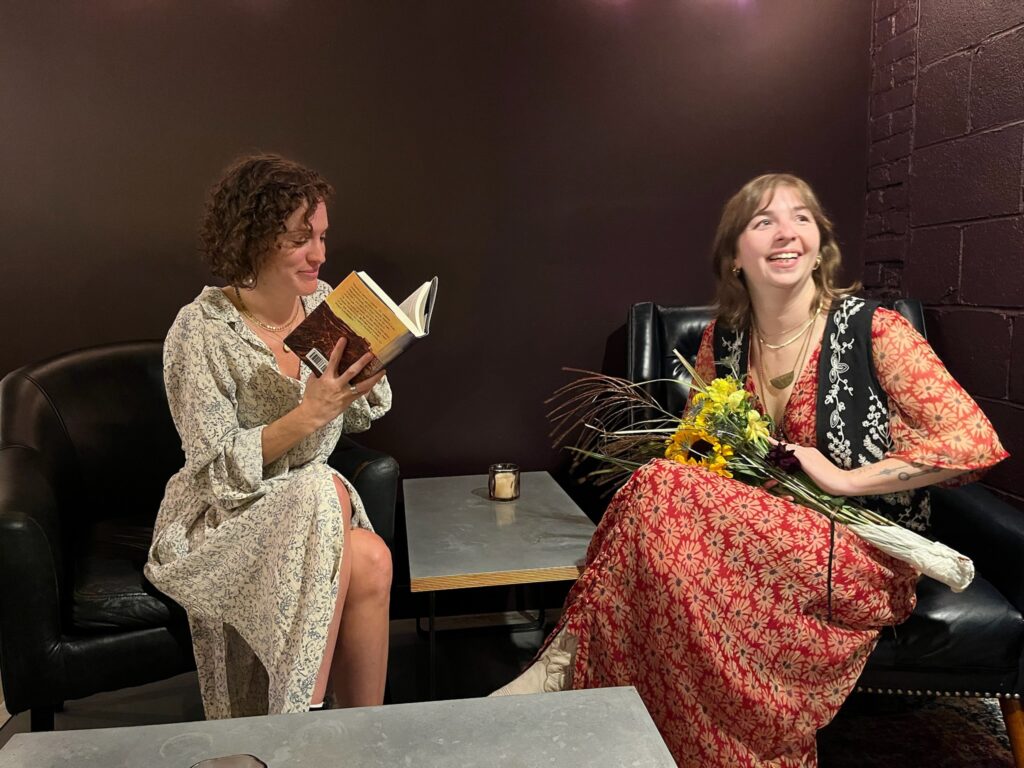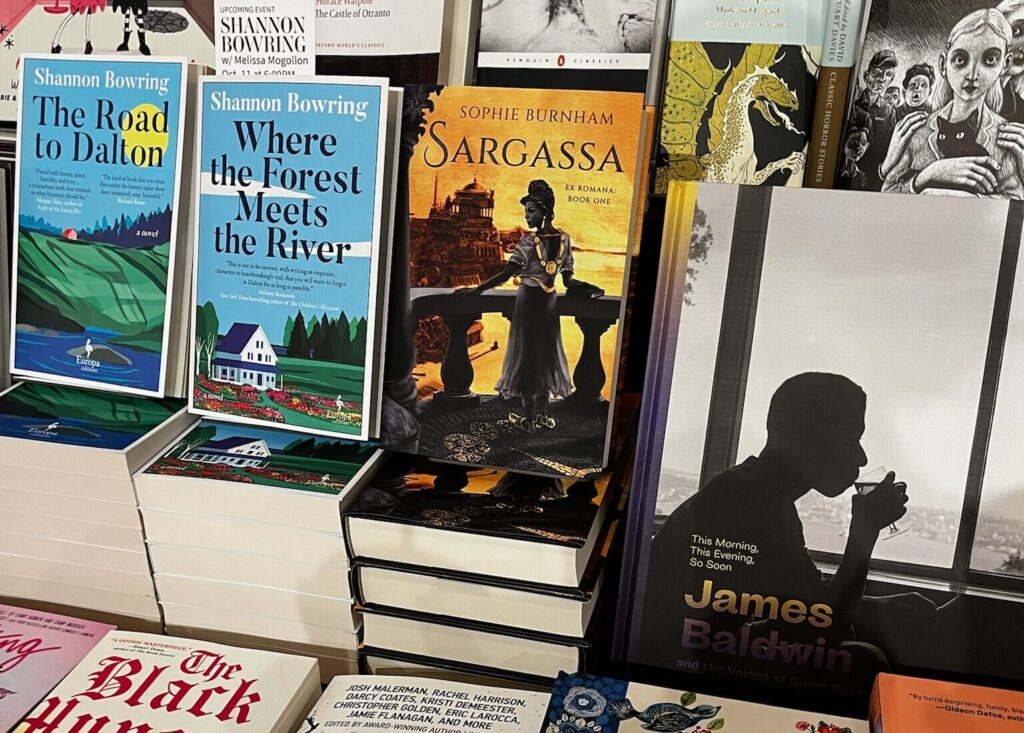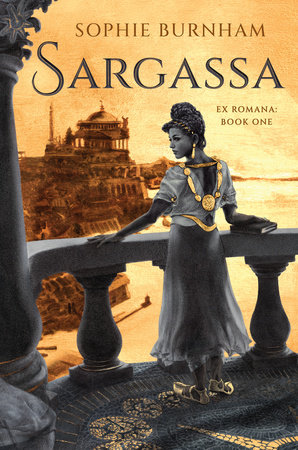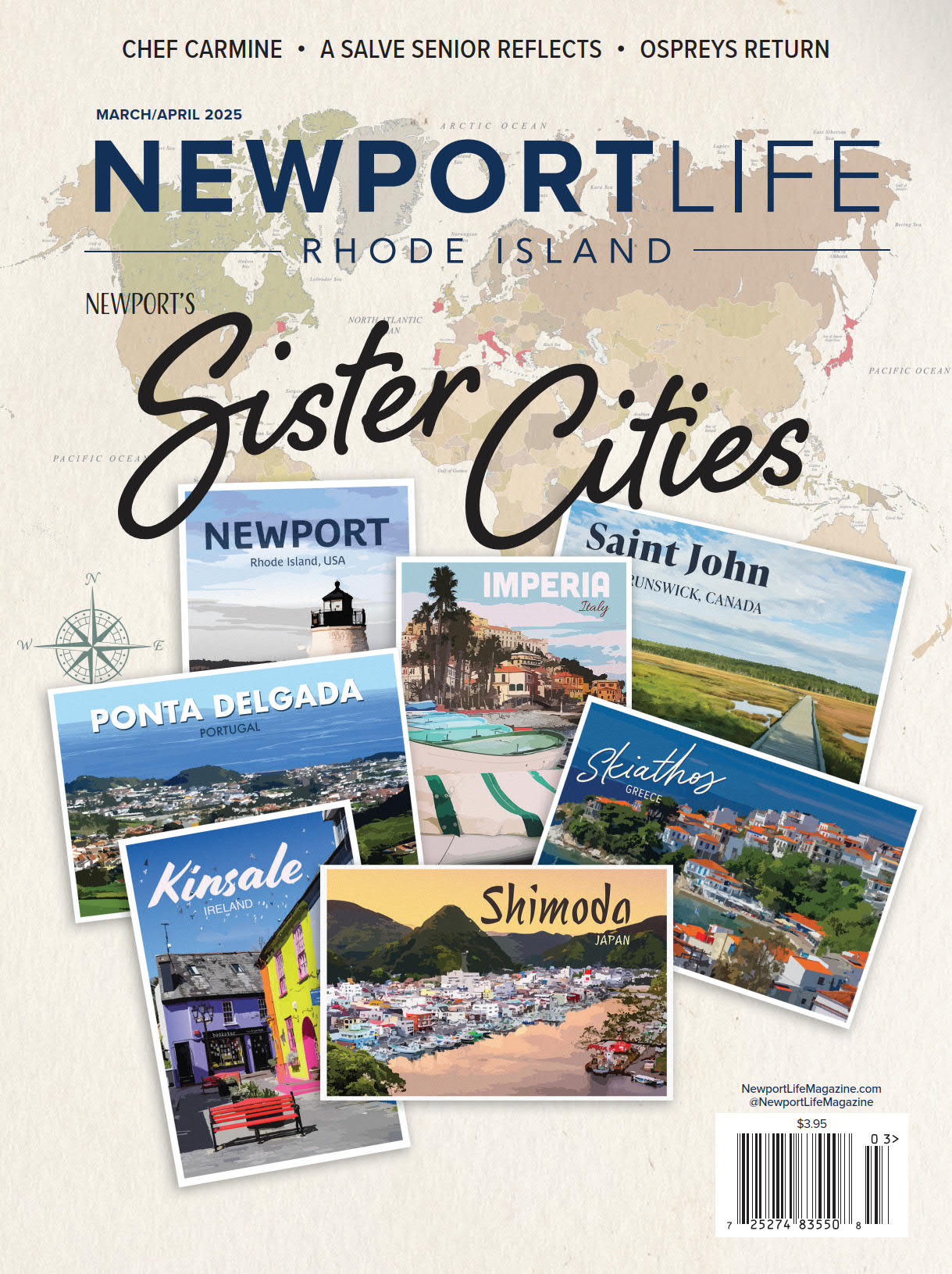Living the Life: Q & A with local author Sophie Burnham
By Sarah Winters

For the series “Living the Life,” the magazine asked Sophie Burnham some questions about their debut novel ‘Sargassa’. Sophie will be talking about the novel at Charter Books on Tuesday, October 15th at 6 p.m., followed by an “After-Hang” at House of Waves from 7-9 p.m.
Q: Tell us a little about yourself. How did you come to be in the Newport area?
A: I started my creative path as an actor, earning a BFA from the conservatory program at Syracuse University. That’s also where I fell in love with directing and playwriting, though, so I consider myself more of a theater-maker than anything. But that quickly led to me moving to New York and then LA to grow a career in screenwriting, which ultimately turned into writing novels. I do any and all of the above whenever it most makes sense, so I suppose you could call me a multimedia storyteller.

As for how I came to be in the Newport area, I didn’t originally have a choice about that. I was born and raised in Middletown, in the same house where my parents still live today. After spending such a long time away, I was lucky to have such a vibrant community of friends and family to return to.
Q: What’s your writing background?
A: I have formal education in playwriting from Syracuse University and the genius Kyle Bass, but the rest is largely self-taught. That means devouring books on craft—for screenwriting, Screenplay by Syd Field and Save the Cat by Blake Snyder are the sacred texts—but also just reading as many scripts and screenplays and novels as I could, both good and bad. When I decided I wanted to learn screenwriting, I had an entry level job at the time at a film studio where one of my duties was reading through the slush pile. Which meant that I read a lot of bad screenplays—and that was invaluable. I learned very quickly what didn’t work.
Something that’s ultimately really important to the foundation of my writing background, though, especially as I turned towards novels, are my origins as an actor. My first understandings of narrative come from the stage, and interpersonal character relationships. That’s always at the foundation of my writing. I think that my different iterations of narrative craft are always there helping to inform each other.
Q: How would you describe your creative process?
A: Throwing spaghetti at the wall to see what sticks. I really wish I had a set process. I listen to other authors and creatives talk about theirs and seethe with jealousy. But I’ve tried to stick to one and it just doesn’t work. One project demands a detailed outline, and the next throws a fit if I try to confine it with one. Every new project is constantly teaching me how it wants to be written, and I’ve finally given up fighting them on that.
Q: How did you come up with the story for Sargassa? Did you know from the beginning it was going to be a trilogy?
A: The story for Sargassa didn’t arrive fully-formed all at once, but it did sort of come spilling out over the course of a July 4th weekend.
The idea that the United States is a dying empire had been turning in my mind for a while at that point. I don’t think it’s unusual, exactly, to hear that sentiment these days, but it was the summer of 2018 at the time so I, at least, hadn’t heard anyone say that in casual conversation. I was still living in LA at the time and it all came to a head for me—something about the powder keg tempers of the Trump Era and the façade of the Fourth of July and the wildfires raging in the hills and people still setting off fireworks, and this idea came pouring out of me over a three-day long weekend. A modern-day North America colonized by the Roman Empire. So sociologically different from what we know, and yet you scratch the surface and it’s not really different at all.
For the record, I’m not a Roman history buff. I was drawn to Ancient Rome as the proxy because of that certain kind of person who gets a little too stoked about the Roman Empire and you can just tell it’s a dog whistle for white supremacy and other Stuff™.

Q: What’s it like sharing what you love to do with readers? Especially at local bookstores?
A: I’m very new to this. Sargassa is my first novel. So I’ve just started to dip my toe into the experience of sharing that with readers, and it’s completely unlike the instant gratification of theater, where you’re all living in the same moment together. I’ve lived with these characters and this world and these scenes alone in my head for five years, and finally I’m getting to release them out into the world to belong to everyone else. My imaginary friends are finally becoming other people’s imaginary friends.
So far, though, it’s been nothing but wonderful. Inherent delays aside, it’s really not all that different from anything else I’ve done. Art is just me taking all of my experience and all of my stuff and putting it into something, and then there’s a weird alchemy that happens at that meeting place. I have no control over that. And I love the conversations I’ve been having with readers to find out what that weird alchemy is.
Q: How would you describe your book to people who are unfamiliar with it?
A: Sargassa is part political thriller, part coming of age story, and the first in a trilogy taking place in the modern day North America of a Roman Empire that never fell, but instead colonized half the globe. This is a genre-bending speculative fiction epic with an ensemble cast of chaotic disaster queers who are (for the most part) doing their best. It’s the sprawling story of an empire on the brink, told through close and intertwining personal narrative, because the personal is political. It asks thorny, complicated questions while making space for twenty-somethings to be twenty-somethings. I stumbled on this term ‘hope punk’ recently, and while I think that’s probably too expansive to be a genre definer, I think it describes my work and this book in particular pretty well. Things can get pretty grim, but at the end of the day, it’s always about hope.
Q: What was the publishing process like? How long did it take to get your book out into the world? What are you working on now?
A: I really didn’t know anything about the publishing industry at the start. Like I said, this was just supposed to be a piece for my screenwriting portfolio. But the more friends and colleagues who read it, the more excitement built around it, and the more I wanted to know what happened next. So I sent it around to some people I knew in the TV acquisitions and development world, and got a pretty universal response: “Creatively, this is fantastic, but it’s going to be impossible to get a TV exec to greenlight something in SFF that isn’t based on previously-existing intellectual property.” Then March 2020 happened and suddenly I had a lot of time on my hands. So I decided to reverse-engineer my own IP. By the time I was done with that, I didn’t really care if this story ended up on a screen. I’d completely fallen in love with this novel I’d created, hopefully the first of three, and I just wanted to see it in print.
I eventually landed an offer from a small press, and my now-agent offered to represent me through the process, and we were off to the races. Or so I thought. What happened next is very convoluted and annoying and was actually kind of traumatizing at the time, but essentially that small press disappeared off the face of the earth overnight, just a few months before my pub date. I don’t really believe that everything happens for a reason, but as devastating as that moment in time was, I do think it was the best thing that could have happened. After we’d secured the rights back, I worked on some revisions before my agent took Sargassa back out on submission. The trilogy landed with the phenomenal team at DAW Books, headed up by my incredible editor Navah Wolfe, and I couldn’t be happier with its new home.

As for what’s next, the second (and currently untitled) Ex Romana book comes out next October, and the third is slated for a year from then. I would still love to see this story and this world translate to screen someday, and in a perfect world I’d be involved in that on a writing room level.
During the weird period of time between the small press shuttering and landing my new deal with DAW, I wrote a very dark, very gay fantasy duology. It’s the sort of project that both terrifies and thrills me, so I’m taking that as a good sign.
Q: What’s some advice you have for others trying to break out as authors?
A: Both writing and querying can be incredibly lonely endeavors, but they absolutely don’t have to be. So find friends and feedback partners. Get in writing groups. Talk to people who have been in the query trenches before and find out how it works. But also, don’t get too bogged down by numbers and stats once you’re in the query trenches themselves. Everyone has a different journey. On the flip side, don’t discount self-publishing as a route! It’s a completely different career, one that I didn’t take because I took the time to learn how it worked and I decided I definitely didn’t have the work ethic for it. Self-published authors are incredible.
Q: What’s a memory from the writing process of Sargassa you’d like to share?
A: Oh wow, so many! But narrowing it down to just one… I’ll take you back to when I was living in LA, before this was even a novel draft. I was the assistant to the head of film at that production studio, and my boss had asked to read the spec script. Let’s establish a few things: We had a great relationship. I wasn’t great at my job, not the organization part of it, etc. She was great at hers. She missed a meeting because she was so absorbed in the script.
Q: What books or authors are you currently reading? Are they different from the kinds of books you were reading while writing Sargassa?
A: You know, this question made me realize that I was writing the first drafts of Sargassa around the same time I first read two books that I consider recent classics in the speculative fiction genre. The Space Between Worlds by Micaiah Johnson and Wilder Girls by Rory Power. At the time, I was definitely keyed into novels that walked the line between science fiction and something else.
I’m currently reading a lot of fellow 2024 debuts at the moment, because we’re all so excited for each other! So it’s a total mixed bag. I just finished Sorcery and Small Magics by Maiga Doocy and Memento Mori by Eunice Hong, and I have some spooky titles waiting just in time for October. Antenora by Dori Lumpkin, Such Lovely Skin by Tatiana Schlote-Bonne, and Necrology by Meg Ripley. My current current read, though, is The Serpent Called Mercy by Roanne Lau, which doesn’t come out until next March. Perks of the job. But trust me, you don’t want to miss this one.
To keep up with Sophie’s latest endeavors, head to www.sophieburnham.com.


